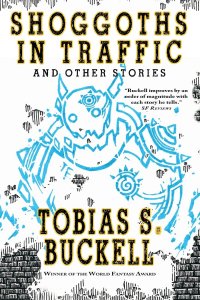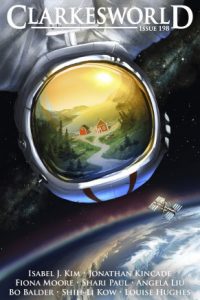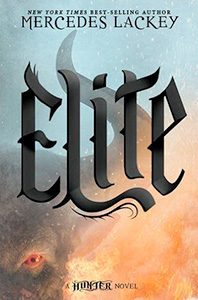Paul Di Filippo Reviews Shoggoths in Traffic and Other Stories by Tobias S. Buckell
 Shoggoths in Traffic and Other Stories, Tobias S. Buckell (Fairwood Press 978-1933846187, trade paperback, 328pp, $17.99) November 2021.
Shoggoths in Traffic and Other Stories, Tobias S. Buckell (Fairwood Press 978-1933846187, trade paperback, 328pp, $17.99) November 2021.
The twentieth anniversary of Tobias Buckell’s first story appearance, “The Fish Merchant,” in Science Fiction Age for March 2000 (making him one of editor Scott Edelman’s many insightful launches), has come and gone without much ado, although by rights it should have been celebrated widely. For Buckell has become a solid fixture in the genre, one whose byline always guarantees stimulating reading. Curiously, to my mind, he’s kind of a transgenerational figure, with some of his roots and attributes harking back to the pre-internet modes of the field, and some of his concerns and presentations resonating more with the twenty-first century lineaments of commercial fantastika. Really, I think we get the best of both worlds with Buckell’s writing: respect and reverence for the cream of the classics, with an au courant hotline to the zeitgeist of 2021.
His current collection features over two dozen tales, and it’s not possible for me to waltz synopsisingly through all of them in this space. So I’ll single out a few that illustrate all the different things that Buckell does so well. As is usually the case with single-author collections, all these stories save one have been previously published, but many of them existed only on Buckell’s exclusive Patreon page and thus will be totally new to most readers.
Buckell (and, presumably, book editor Patrick Swenson, whose Fairwood Press has been knocking ‘em out of the park for the past several years) had the great idea of opening and closing the volume with two zombie stories, but ones that use the trope more for metaphor than splatter thrills. “A Different Kind of Place” maps our current Covid insanity directly onto its zombie scenario, highlighting human self-damaging perversity. And on the way out of the book, “Zombie Capitalism” satirizes the American tendency to privilege business over lives.
Zombies trumped HOA rules.
“UTD won against the government.” The judge on the case ruled that getting the military involved unfairly influenced the market. Ultra Tactical Dynamics, a company built just to provide zombie and zombie home defense produces, would lose all its business if the National Guard defeated the zombie hordes. And that was anti-capitalist and un-American.
Second amendment rights trumped governmental anti-zombie actions.
The title story resonates with the almost simultaneous publication of Tim Powers Alternate Routes, insofar as both fictions postulate occult forces at work via the US highway system. The allied tale “Brickomancer” (our previously unseen gem) deals also with an urban fantasy milieu where graffiti serves as sigils to keep the occult at bay. There’s almost a bit of Harlan Ellison modern mythologizing at play here.
Buckell exhibits a lot of stylistic flair and period evocativeness with his two Weird Westerns, “Sundown” and “The Scar that Stains Red the Gulch”. If you can imagine a fusion of Lucius Shepard and Joe Lansdale, you’ll get a sense of their allure.
The next four tales—“Tides”; “The Widow’s Cut”; “On the Eve of the Fall of Habesh”; and “The Seafarer”—all revel in the building of secondary worlds, as Buckell reveals in his candid and entertaining story endnotes. Sometimes these worlds hark more to Le Guin styles (“Tides”) while others (“On the Eve of the Fall of Habesh”; “The Seafarer”) exult in an almost Robert E. Howard vibe—and done with unalloyed vigor and brio.
With “When All Was Brillig”, Buckell goes almost Van Vogtian:
How long was the great Line? A thousand miles? A million? It pulled people from its past, its future, from other worlds gauzily next to ours…[But] the Entropic War could never be won, could it?
Displaying a Gaimanish flair for recasting fairy tales into ultramodern circumstances, “Mr. Skin’s Heart” finds a young woman forced to pay a mythic fee to atone for her gambling debts. Is a figure like Superman the ultimate “illegal alien?” Such a conflation is deftly limned in “The Alien from Verapaz”, with deep human emotions consorting well with superhero riffs. Finally, it’s hard to beat a swift, short shocker in the vein of Rapture Noir that we get in “The Atheist and the Angel”.
Buckell uses his Caribbean heritage to good effect in many of these stories, invigorating our genre with worldviews and characters and cultural talismans not often deployed before now. He is equally adroit whether depicting vulnerable and gentle folks, or outright antiheroes. And his prose style is clean and uncluttered, yet not lacking low-key poetry:
It was moonlight-time and the second sun, orange and stately, slipped into the inky depths of the Roranraka sea. The first sun had been quenched for well over a tide. Siana played in the silver pools the tide had left behind, looking for spiraled shells that she could decorate her new room with…. [She] carefully stepped her way between the pools. In a funny looking kidney-shaped pool she paused and squatted to try and peer through the mirrored surface. The hem of her gray skirt touched the water and turned even darker. It stirred ripples into the surface as she shifted.
Ultimately, this collection reveals a true craftsman of the field whose tales exhibit both professional pride of construction and deeply felt personal responses to the demands, challenges, seductions and puzzlements of our glorious universe.
 While you are here, please take a moment to support Locus with a one-time or recurring donation. We rely on reader donations to keep the magazine and site going, and would like to keep the site paywall free, but WE NEED YOUR FINANCIAL SUPPORT to continue quality coverage of the science fiction and fantasy field.
While you are here, please take a moment to support Locus with a one-time or recurring donation. We rely on reader donations to keep the magazine and site going, and would like to keep the site paywall free, but WE NEED YOUR FINANCIAL SUPPORT to continue quality coverage of the science fiction and fantasy field.
©Locus Magazine. Copyrighted material may not be republished without permission of LSFF.







